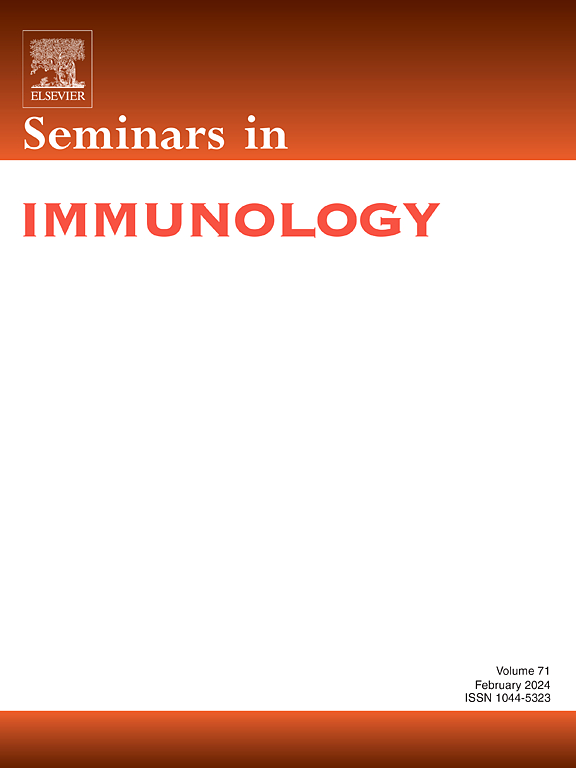The role of sialoglycans in modulating dendritic cell function and tumour immunity
IF 7.4
2区 医学
Q1 IMMUNOLOGY
引用次数: 0
Abstract
Dendritic cells (DCs) are crucial for initiating immune responses against tumours by presenting antigens to T cells. Glycosylation, particularly sialylation, plays a significant role in regulating cell functions, by modulating protein folding and signalling. This review aimed to provide a comprehensive overview of how sialic acids influence key aspects of DC biology, including maturation, migration, antigen presentation, and T cell interactions. Sialic acids influence DC endocytosis, affecting their ability to uptake and present antigens, while guiding their migration to lymph nodes and inflamed tissues. Removing sialic acids enhances DC-mediated antigen presentation to T cells, potentially boosting immune responses. Additionally, sialylated glycans on DCs modulate immune checkpoints, which can impact tumour immunity. Hypersialylation of tumour mucins further promotes immune evasion by interacting with DCs. Understanding the interplay between sialylation and DC functions offers promising avenues for enhancing cancer immunotherapy.
硅藻糖在调节树突状细胞功能和肿瘤免疫中的作用
树突状细胞(DC)通过向 T 细胞展示抗原,对启动针对肿瘤的免疫反应至关重要。糖基化,尤其是ialylation,通过调节蛋白质折叠和信号传导,在调节细胞功能方面发挥着重要作用。本综述旨在全面概述硅烷酸如何影响直流电生物学的关键方面,包括成熟、迁移、抗原呈递和 T 细胞相互作用。硅酸影响直流细胞的内吞作用,影响其摄取和呈现抗原的能力,同时引导其向淋巴结和炎症组织迁移。去除ialic酸可增强DC介导的向T细胞呈递抗原的能力,从而增强免疫反应。此外,DC 上的糖基化聚糖还能调节免疫检查点,从而影响肿瘤免疫。肿瘤粘蛋白的高ialylation通过与DC相互作用,进一步促进免疫逃避。了解糖基化与直流电功能之间的相互作用为加强癌症免疫疗法提供了有希望的途径。
本文章由计算机程序翻译,如有差异,请以英文原文为准。
求助全文
约1分钟内获得全文
求助全文
来源期刊

Seminars in Immunology
医学-免疫学
CiteScore
11.40
自引率
1.30%
发文量
50
审稿时长
89 days
期刊介绍:
Seminars in Immunology is a specialized review journal that serves as a valuable resource for scientists in the field of immunology. The journal's approach is thematic, with each issue dedicated to a specific topic of significant interest to immunologists. It covers a wide range of research areas, from the molecular and cellular foundations of the immune response to the potential for its manipulation, highlighting recent advancements in these areas.
Each thematic issue is curated by a guest editor, who is recognized as an expert in the field internationally. The content of each issue typically includes six to eight authoritative invited reviews, which delve into various aspects of the chosen topic. The goal of these reviews is to provide a comprehensive, coherent, and engaging overview of the subject matter, ensuring that the information is presented in a timely manner to maintain its relevance.
The journal's commitment to quality and timeliness is further supported by its inclusion in the Scopus database, which is a leading abstract and citation database of peer-reviewed literature. Being indexed in Scopus helps to ensure that the journal's content is accessible to a broad audience of researchers and professionals in immunology and related fields.
 求助内容:
求助内容: 应助结果提醒方式:
应助结果提醒方式:


